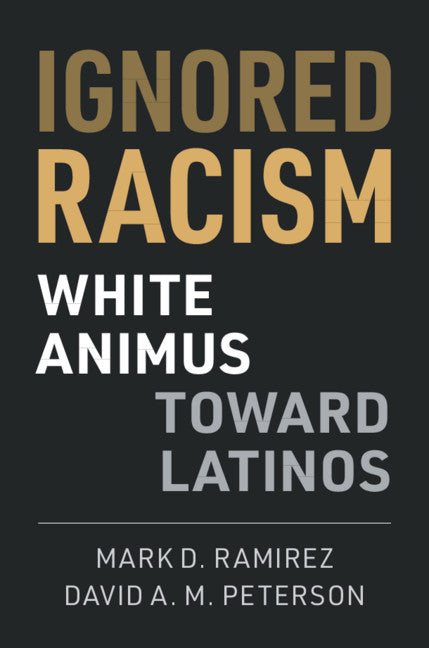Freshly Printed - allow 4 days lead
Couldn't load pickup availability
Ignored Racism
White Animus Toward Latinos
Whites' animus toward Latinos is a fundamental force in American politics, uniquely shaping public opinion across a range of domains.
Mark D. Ramirez (Author), David A. M. Peterson (Author)
9781108495325, Cambridge University Press
Hardback, published 25 June 2020
238 pages, 52 b/w illus. 28 tables
23.5 x 15.6 x 1.6 cm, 0.46 kg
'There is no question that based on the analyses of survey data presented in Ignored Racism, as well as the results of the several original experimental analyses presented in the book, Ramirez and Peterson have made a strong case for the importance of their measure of LRE, and we believe that this measure needs to be taken seriously.' Richard C. Fording and Sanford Schram, Critical Dialogue
Although Latinos are now the largest non-majority group in the United States, existing research on white attitudes toward Latinos has focused almost exclusively on attitudes toward immigration. This book changes that. It argues that such accounts fundamentally underestimate the political power of whites' animus toward Latinos and thus miss how conflict extends well beyond immigration to issues such as voting rights, criminal punishment, policing, and which candidates to support. Providing historical and cultural context and drawing on rich survey and experimental evidence, the authors show that Latino racism-ethnicism is a coherent belief system about Latinos that is conceptually and empirically distinct from other forms of out-group hostility, and from partisanship and ideology. Moreover, animus toward Latinos has become a powerful force in contemporary American politics, shaping white public opinion in elections and across a number of important issue areas - and resulting in policies that harm Latinos disproportionately.
1. Racism ignored
2. The racialization of Latinos
3. The measurement of Latina/o racism/ethnicism
4. Why white America opposes immigration
5. Attitudes about punishment and policing
6. Why whites favor restrictive voting laws
7. The electoral implications of Latina/o racism/ethnicism
8. Conclusion.
Subject Areas: Politics & government [JP], Social, group or collective psychology [JMH], Sociology [JHB], Ethnic studies [JFSL], History of the Americas [HBJK]


